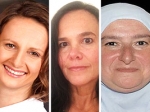 GOLD Learning Speakers
GOLD Learning Speakers


Kergie Leitgeb, MD, IBCLC
Monica Vilela Carceles Fraguas, MD, IBCLC
Amal El Taweel, MD, PhD
- Speaker Type: ABM Conference 2016
- Country: GOLD
Biography:
MD Dr. Kergi Leitgeb, IBCLC is a General Practitioner in private practice specializing in the care of breastfeeding mothers with a focus on medical issues of lactation including sucking skills, tongue-tie and medications during breastfeeding.
She has been working in lactation counselling for over 10 years with La Leche League and for the Public Health Initiative for breastfeeding. In 2012 she completed the IBCLC exam and started to work as an independent lactation consultant. Besides her work in private practice, she continues to work as a GP doing locums and on-call duty for the Red Cross.
Dr. Leitgeb is involved in activities with La Leche League Austria, such as training of new counselors, representing the Association of Breastfeeding Lactation Austria in her region and initiates and organizes many events related to breastfeeding. She is an accredited assessor for BFHI and has been involved with several hospital accreditations in Austria.
Monica Vilela Carceles Fraguas: Graduation: 1983, University of Sao Paulo, School of Medicine Residence in Pediatrics: 1984/1985, Hospital das Clinicas - School of Medicine - University of Sao Paulo Training in Neonatology: 1986, Hospital das Clinicas - School of Medicine - University of Sao Paulo Clinical practice in Neonatology since 1987 Chief of the Well Newborn Nursery of Promatre Paulista since 2009 Medical Coordinator of the Breastfeeding Supporting Group in Promatre Paulista
Dr. Amal El Taweel, MD, IBCLC Graduate of Cairo Faculty of Medicine (1986). Master's of pediatrics, Cairo University (1992). Doctorate of Pediatrics, Al Azhar University (2002). Devoted to breastfeeding promotion since certification as IBCLC in 2003. Treasurer, Executive manager and educational coordinator of the Egyptian Lactation Consultants' Association (ELCA). Director and main lecturer of the reputable Certificate Program of Lactation Management conducted by ELCA since 2004 whose graduates are around 400 Egyptian and some Arab IBCLCs and replicating the same course in Madinah Monawarah, Kingdom of Saudi Arabia, since October 2015 and Jeddah, Kingdom of Saudi Arabia, recently this March 2016 . Member of International Lactation Consultant Association (ILCA) since 2008 and ILCA multicultural committee since 2011. Member of the Academy of Breastfeeding Medicine since 2009. International Baby Food Action Network (IBFAN) Arab World since 2009. Speaker in many national, Arab and international conferences e.g. ILCA/ VELB 2010 in Basel Switzerland, ILCA 2012 in Orlando USA, ILCA 2015 in Washington DC USA and presenter of many web seminars. Author of many internationally published papers in the field of lactation. I conduct research in diverse areas of lactation like growth, development, microbiology, parasitology, physiotherapy, professional development, neonatology and pediatrics.
Moderator: Wendy Brodribb, MPPBS, PhD, FABM






